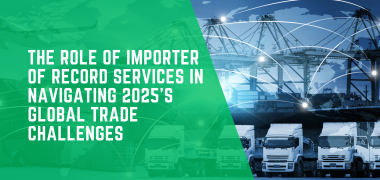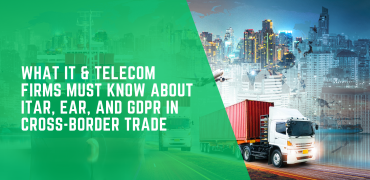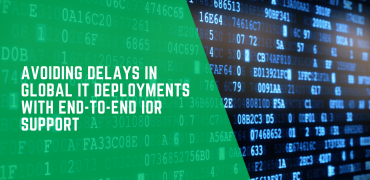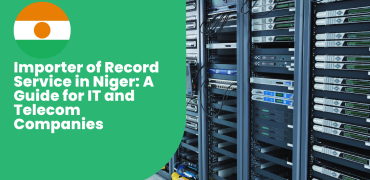The Role of Importer of Record Services in Navigating 2025’s Global Trade Challenges
As global trade continues to evolve, businesses face increasingly complex challenges in navigating regulatory frameworks, ensuring compliance, and managing logistics across borders. The year 2025 brings a new set of hurdles, including dynamic trade policies, rising geopolitical tensions, and technological disruptions. Against this backdrop, Importer of Record (IOR) services play a pivotal role in enabling businesses to streamline international operations and mitigate risks. This blog delves into the significance of IOR services in addressing global trade challenges and explores how they empower organizations to thrive in today’s intricate trade landscape.
Understanding the Importer of Record (IOR) Concept
An Importer of Record is an entity responsible for ensuring that goods comply with all local laws and regulations during the importation process. This includes:
- Customs Compliance: Filing necessary documentation and declarations to meet regulatory requirements.
- Tax and Duty Payments: Ensuring accurate calculation and timely payment of applicable duties and taxes.
- Licensing and Permits: Acquiring any required licenses or permits for specific goods or restricted imports.
- Liability: Taking accountability for legal and financial obligations associated with the import process.
For businesses operating internationally, partnering with an IOR service provider simplifies these responsibilities, allowing them to focus on core operations while ensuring seamless compliance.
Key Global Trade Challenges in 2025
1. Complex Regulatory Environments
With countries continually revising their trade policies, staying compliant with diverse regulations is a daunting task. These include:
- Data Localization Requirements: Governments increasingly mandate that certain types of data be stored within national borders, complicating the import of IT and telecom equipment.
- Sustainability Regulations: Many nations now require businesses to adhere to environmental standards, such as carbon footprint reporting for imported goods.
- Sanctions and Export Controls: Evolving geopolitical tensions result in frequent changes to sanctioned entities and restricted goods lists.
2. Geopolitical Instability
Ongoing trade disputes, regional conflicts, and protectionist policies create uncertainty in global supply chains. Businesses must adapt to shifting tariffs, embargoes, and retaliatory trade measures that can impact costs and timelines.
3. Supply Chain Disruptions
The post-pandemic world has seen persistent disruptions in supply chains due to:
- Shipping Delays: Port congestion and limited container availability.
- Labor Shortages: Workforce challenges in logistics and manufacturing sectors.
- Natural Disasters: Climate change-induced events affecting transportation routes.
4. Cybersecurity Threats
As supply chains digitize, they become vulnerable to cyberattacks. Protecting sensitive data, such as trade documents and customer information, is critical to maintaining trust and avoiding penalties.
5. Rising Costs and Inflation
Inflationary pressures drive up the costs of goods, transportation, and compliance. Businesses must balance maintaining profitability with adhering to legal requirements.
How IOR Services Address These Challenges
IOR service providers act as invaluable partners, offering solutions to the complexities of global trade. Here’s how they help:
1. Navigating Complex Regulations
IOR providers specialize in understanding and complying with local laws, ensuring businesses meet regulatory requirements in every market they operate. This expertise includes:
- Customs Documentation: Preparing accurate and complete paperwork to avoid delays and penalties.
- Trade Compliance: Staying updated on changing trade policies and ensuring imports align with them.
- Product Classification: Accurately categorizing goods under Harmonized System (HS) codes to determine applicable duties and taxes.
2. Mitigating Geopolitical Risks
IOR services help businesses adapt to geopolitical shifts by:
- Advising on Tariff Changes: Identifying opportunities to minimize costs through trade agreements or tariff engineering.
- Ensuring Sanction Compliance: Monitoring restricted entities and embargoed goods to avoid violations.
- Diversifying Supply Chains: Suggesting alternative sourcing strategies to reduce dependency on high-risk regions.
3. Ensuring Supply Chain Continuity
By handling the legal and logistical aspects of importation, IOR providers contribute to smoother supply chain operations:
- Expedited Customs Clearance: Leveraging expertise to navigate customs processes efficiently.
- Managing Import Delays: Addressing issues such as documentation errors or compliance disputes proactively.
- Warehousing and Distribution: Offering integrated solutions to manage inventory and last-mile delivery.
4. Enhancing Cybersecurity
IOR service providers often implement advanced technologies to secure sensitive data and ensure compliance with data protection regulations. This includes:
- Secure Data Transmission: Encrypting trade documents and communication channels.
- Compliance with Data Localization Laws: Facilitating the import of IT equipment while adhering to local data storage requirements.
5. Cost Optimization
Partnering with an IOR service provider can yield significant cost savings through:
- Accurate Duty Calculations: Avoiding overpayment or penalties due to misclassification.
- Reducing Administrative Burden: Allowing businesses to allocate resources to strategic initiatives rather than compliance management.
- Leveraging Economies of Scale: Accessing competitive rates for freight, warehousing, and other logistics services.
Technology’s Role in Modern IOR Services
Technology is revolutionizing the way IOR services operate, enabling greater efficiency and transparency. Key advancements include:
1. Blockchain for Trade Transparency
Blockchain technology provides a tamper-proof ledger for recording transactions, enhancing trust and traceability in supply chains. It enables:
- Real-Time Tracking: Monitoring shipments and compliance status.
- Fraud Prevention: Reducing risks associated with counterfeit goods and document manipulation.
2. AI-Powered Compliance Tools
Artificial intelligence helps IOR providers analyze large datasets to:
- Identify Regulatory Changes: Detect updates in trade policies and assess their impact.
- Optimize Processes: Automate documentation preparation and duty calculations.
3. Internet of Things (IoT)
IoT devices improve supply chain visibility by:
- Tracking Shipments: Providing real-time data on location, temperature, and condition.
- Proactive Issue Resolution: Alerting stakeholders to potential delays or damage.
4. Cloud-Based Solutions
Cloud platforms facilitate seamless collaboration among stakeholders by:
- Centralizing Data: Enabling easy access to trade documents and compliance records.
- Scalability: Supporting businesses as they expand into new markets.
Case Studies: IOR Services in Action
1. IT Equipment Importation
A global tech company needed to deploy servers in multiple countries with stringent data localization laws. Partnering with an IOR provider ensured compliance with local regulations, expedited customs clearance, and avoided costly penalties.
2. Healthcare Industry Compliance
A pharmaceutical firm faced challenges importing medical devices due to complex regulatory requirements. The IOR service managed documentation, obtained necessary certifications, and facilitated seamless importation, enabling timely delivery to healthcare facilities.
Choosing the Right IOR Partner
Selecting an IOR provider is a critical decision. Businesses should consider:
- Experience and Expertise: Knowledge of industry-specific regulations and global markets.
- Technological Capabilities: Use of advanced tools for compliance and supply chain visibility.
- Global Network: Presence in key markets to support cross-border operations.
- Customer Support: Availability of dedicated teams to address issues promptly.
Conclusion
In 2025, the complexities of global trade demand robust solutions to navigate regulatory, logistical, and geopolitical challenges. Importer of Record services offer businesses the expertise and tools needed to ensure compliance, optimize operations, and mitigate risks. By leveraging IOR providers, organizations can focus on their core objectives, confident in their ability to manage the intricacies of international trade. As global markets continue to evolve, the role of IOR services will only grow in importance, serving as a cornerstone of successful and sustainable supply chain management.




